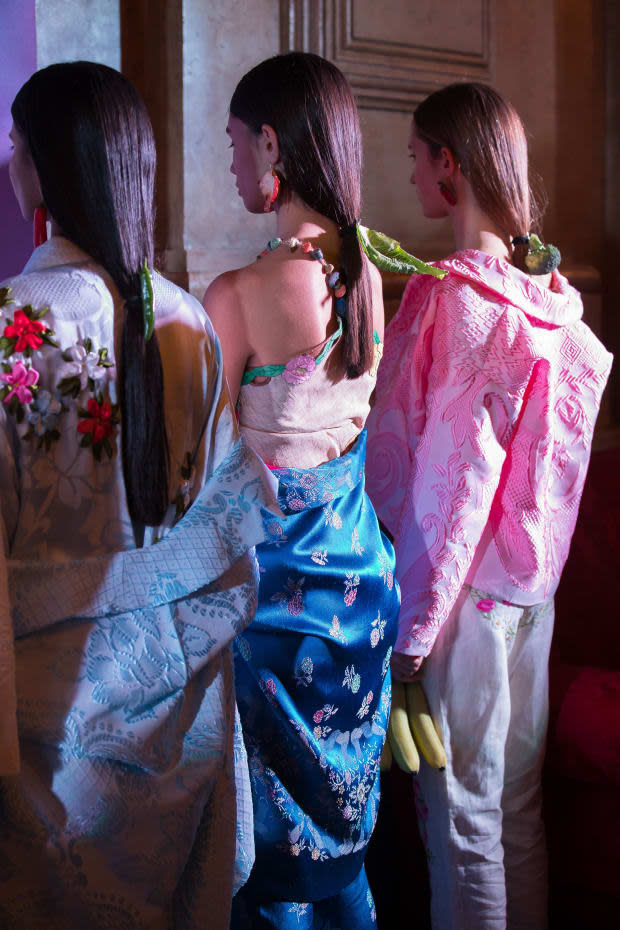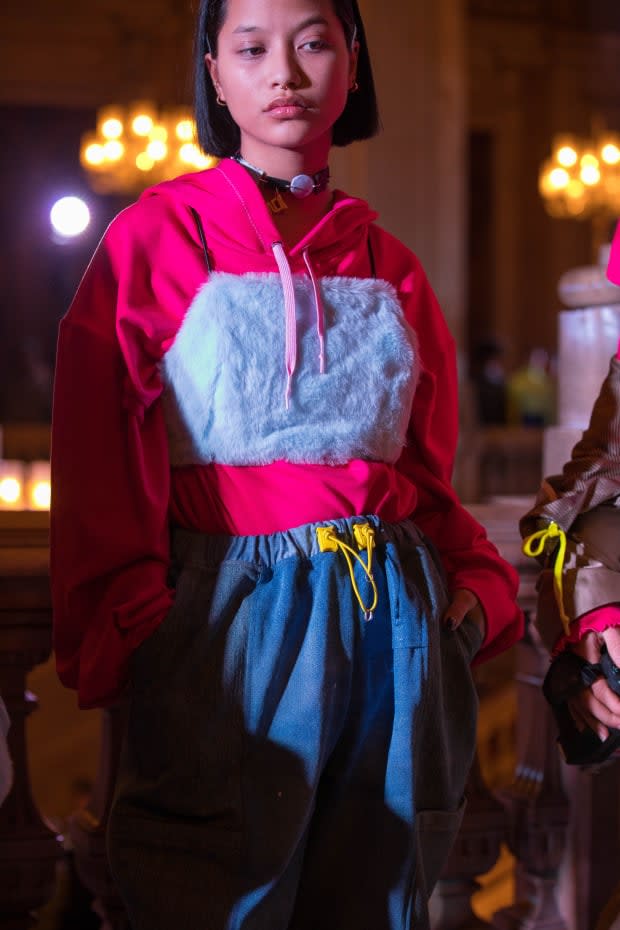Lisbon's Emerging Designers Seek to Strike the Balance Between Sustainability and Creativity
"I'm uneasy about what I do," one knitwear designer admitted. "Because to be fully sustainable you shouldn't make any clothes at all — but I have to be creative."

To many, the term "sustainable fashion designer" is an oxymoron. Considering our current climate and ecological crisis and the fact that the fashion industry is responsible for a significant (if hard to quantify) negative impact on the environment, it seems we should be urgently halting any new production.
But such black-and-white dicta don't leave room for a new generation of emerging designers to carve a place for themselves in the economically significant sphere that is apparel. Last week during the United Fashion presentation (an exchange project carried out by a cluster of seven European fashion support associations) at ModaLisboa Fashion Week, those designers in the "green capital" battled with this internal conflict.
"I'm uneasy about what I do," knitwear designer Archie Dickens told Fashionista. "As a designer, I find it hard to understand how I can do something without doing nothing. Because to be fully sustainable you shouldn't make any clothes at all — but I have to be creative."
Related Articles
Do We Really Need Any More Sustainable Fashion Brands?
New Certification Helps Brands Communicate Their Commitment to the Environment
Can Fashion Shows Ever Be Environmentally Justifiable?
Dickens claims that in a perfect world we would all be wearing a simple boiler suit uniform — but also that the world isn't perfect and that doesn't seem possible. Instead, his handmade knitwear focuses on creating a small collection of well-made garments.
His latest collection, "Deadstock," was inspired by the efforts of global climate activist group Extinction Rebellion, as Dickens has a few friends involved in the movement. "Deadstock" consists of only seven pieces, as he hopes to create a catalogue in which old designs are still available, rather than presenting entirely new collections each season. He also chose to present using only one model.
"In a sense, I think it's about doing as much as you can without jeopardizing what's important to you," explains Dickens. "Since knitwear is an additive process, everything is fully fashioned with no waste and comes from my studio in Lisbon. I wanted to make what I could and nothing more than anyone needed."

While Dickens is UK-born and Lisbon-based, this focus on quality is something that Salomé Pimentel Areias, Country Coordinator at Fashion Revolution Portugal, says is a signature of fashion attitudes in Portugal.
"Portuguese manufacturing, quality and talented craftsmanship [has] made Portugal one of the best production destinations for northern sustainable brands," says Areias. "There is a beautiful revival of ancient handcraft techniques. We found a way to go back to our roots and traditions and connect them, not only to durability, but also to storytelling."
This rings true for emerging Portuguese designer Joana Duarte, who utilizes antique textiles and explores the historic relationship between Portugal and Asia. Duarte's focus is on human rights, collaboration and fair working conditions for garment workers — something she says is often missing from the mainstream sustainability discussion.
"For me sustainability is just one small part; you have to work with the communities and make sure they're part of it," she says. "I don't understand how you can be 'sustainable' without thinking about the people who make the things, and their families."
Duarte's brand Behen was born from her travels through India. She sources fabrics — like bedspreads — from her grandmother's collection and from flea markets around the world. In partnership with the Aga Khan Foundation, which focuses on breaking the cycle of poverty, Duarte works with a small group of women near Lisbon to produce her pieces and donates a percentage of sales to refugee children in Syria.

At the United Fashion presentation, models wore Behen while carrying broccoli, which they paired with flower slip-on shoes and vegetable accessories like chili pepper earrings, created by another local designer Lex Bouquet. The jewelry collection "Emotions as I see them" explores our relationship between our minds, body and food, something Bouquet became fascinated with after adopting a plant-based diet.
Sarah Owen, Senior Editor at WGSN Insights, has noticed a different approach to sustainability happening in Portugal since first visiting five years ago. Previously based in New York, she has found that Lisbon's embodiment of sustainable practices doesn't seem to be as forced or opportunistic as the fashion greenwashing happening at larger brands in bigger cities.
"While in other regions it has become somewhat 'trendy,' Portugal has naturally lived by sustainable practices by default," she says.
Lisbon-based emerging designer Artur Dias, founder of the slow-fashion project Opiar, can see past the "bullshit" of sustainable promises from large brands that engage with mass production.
"I think it's great that the fashion industry is addressing sustainability, but everything produces waste," Dias says. "I know because I also create. These promises of sustainability are not fooling me."
Instead of adopting the sustainable label, Dias focuses on so-called "real wear," creating hand-made, one-off pieces from things he already has lying around.
The fact that Dias has already seen an uptick of interest in one-off pieces is a testament to the slow-fashion culture that Owen says is starting to put Lisbon on the sustainable fashion map.
"Think of the country's quite low population with mainly small- to medium-sized, family-owned agricultural producers; the plethora of local, organic produce; few fast fashion shops; the emphasis on quality products," says Owen.
While "big businesses have tried to reverse into sustainability," according to Owen, Lisbon's culture focused on social good and the environment has allowed its smaller labels to explore sustainable fashion thoughtfully, self-critiquing their internal conflict about being a designer in the midst of climate crisis along the way.
Disclosure: ModaLisboa provided my travel and accommodations to attend ModaLisboa Fashion Week.